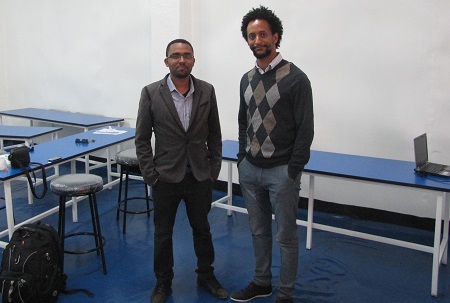Breathing Life Into Ethiopian Health Care: Firm aims ‘to set the bar as high as possible’ as country’s only medical device manufacturer
Tiffani Diage, Fasil Kiros and Birhanu Assefa Belay have an ambitious goal: to create the only medical device manufacturing company in Ethiopia. While there are companies manufacturing basic pharmaceuticals, like saline solutions and alcohol, no one is currently making medical devices.
With funding from the HANSHEP Health Enterprise Fund (HHEF) and Raechelon LLC – a U.S.-based medical device consulting company owned by Diage – Diage teamed with Kiros and Belay to create Echelon Medical Device Manufacturing. (Full disclosure: Echelon has received grant funding through the USAID-funded Strengthening Health Outcomes through the Private Sector (SHOPS) project, led by Abt Associates, which provides direct technical assistance. The author works for Abt Associates.)
Echelon will begin by manufacturing bag valve masks, which are mechanical resuscitation devices used by health professionals to treat neonatal asphyxia or apnea.
The company will distribute these masks through public and private sector channels, with a special emphasis on training health extension workers to use them since they are often the only health professional present during childbirth. Throughout the country, it is estimated that only 10 percent of births have a nurse or higher-level practitioner present.
Unlike most of the other devices currently available on the market, Echelon’s devices will be manufactured locally and will be reusable up to 20 times. Furthermore, the company plans to create upward of 20 jobs for assemblers, accountants and engineers.
But they don’t plan to stop there. When asked where they see their company in five years, Kiros replied, “You won’t find us here (i.e. in their current facility).” In five years, they plan to expand to a larger space, manufacturing additional devices.

In addition to manufacturing the devices in Ethiopia, Echelon will work with the Federal Ministry of Health, the Food, Medicine and Healthcare Administration and Control Authority, and other stakeholders to help build a culture of medical device manufacturing in Ethiopia that is in line with international standards for product quality and safety. Kiros explained that Echelon will serve as a benchmark for other medical device manufacturers in terms of quality and manufacturing standards: “We are going to set the bar as high as possible.”
(Fasil Kiros and Birhanu Assefa Belay in their manufacturing facility in Ethiopia, left. Photo by Montana Stevenson, Abt Associates.)
While studying for her master’s of public health, Diage learned that many developing countries were not manufacturing any of their own basic medical supplies or products, which in turn had an impact on health disparities. Troubled by this paradigm, Diage decided to start her own company, Raechelon, which develops high-quality, safe products and takes them to market. The first place Raechelon LLC decided to invest was Ethiopia, given its strong university system that trains many health care professionals and the government’s commitment to supporting the health sector. From there, Echelon was born.
Together, Diage, Kiros and Belay make a strong management team. Diage, CEO, has 15 years of experience in the medical device manufacturing sector in the United States. Kiros, president, and Belay, COO, have many years of experience as engineers in Ethiopia and Germany. While they are all optimistic about Echelon’s prospects, they admit that the effort has not been without challenges. A major challenge comes in the form of their designation as an international partnership, which requires them to have a significant amount of capital invested in Ethiopia before they can qualify for the business license allowing them to sell their products. However, they are working on a solution to that problem and, with the help of legal advice and technical support provided by the HHEF, they hope to achieve this milestone within the second quarter of 2014.
While the challenges of setting up the first company in an emerging sector can seem daunting, Diage keeps things in perspective: “You can break this (creating a new medical device company) up into very tangible pieces. The first step: Get a facility. The second step: Renovate that facility to the standards necessary. The third step: Hire employees and train them. It not only helps keep it manageable and keep us moving in a forward trajectory, it also helps you feel like you have these small victories along the way which helps you keep motivated to keep going.”
This blog originally appeared on the Strengthening Health Outcomes Through the Private Sector blog.
Montana Stevenson is an associate analyst in the International Health Division at Abt Associates.
- Categories
- Health Care
